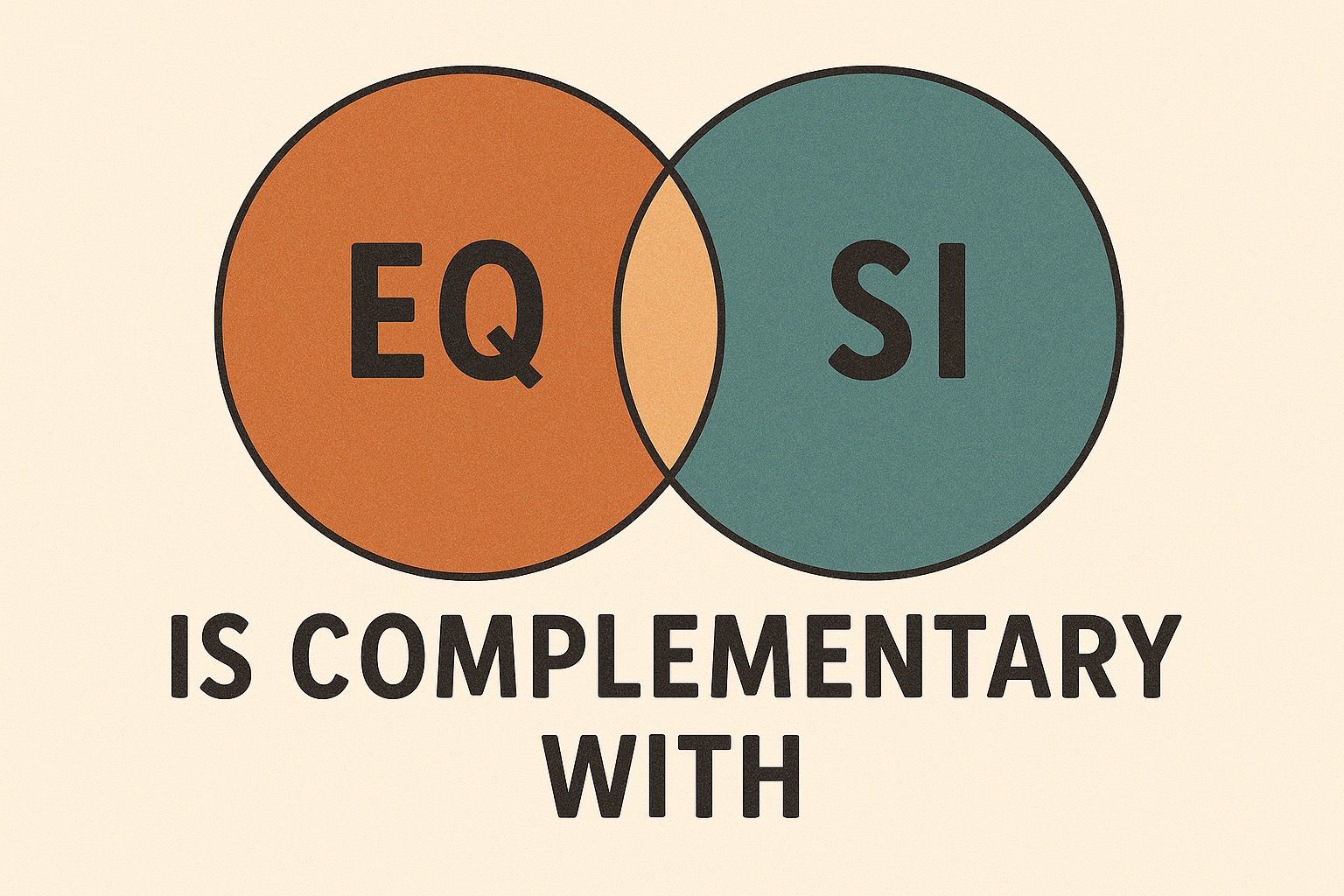The Uncomfortable Truth About Empathy in Sales
After years of research into social intelligence in sales, culminating in my recently published book on the subject: “Social Intelligence in Sales”, I’ve arrived at a controversial conclusion that challenges one of the most sacred beliefs in modern sales training: emotional intelligence and empathy are not just overrated in B2B sales—they’re actively harmful to success.
This assertion runs counter to decades of sales wisdom that positions emotional intelligence as the cornerstone of effective selling. Countless books, training programs, and sales methodologies have elevated EQ and empathy as essential skills for building rapport, understanding customer needs, and closing deals. But this conventional wisdom fundamentally misunderstands the nature of complex B2B buying processes and the role salespeople must play to drive meaningful change.
The distinction between social intelligence and emotional intelligence isn’t merely academic—it’s the difference between sales success and failure. While researching social intelligence, I encountered extensive literature promoting emotional intelligence as the ultimate sales skill. Yet the more I studied actual buying behaviors and successful sales outcomes, the more I realized that EQ often prevents salespeople from doing what customers truly need: being challenged out of their comfort zones.
The Deception of Emotional Comfort
Traditional emotional intelligence training teaches salespeople to read emotional cues, respond with empathy, and maintain harmony in customer relationships. These skills create comfortable interactions where everyone feels understood and validated. On the surface, this approach seems logical—happy customers should be more likely to buy, right?
Wrong. This thinking reveals a fundamental misunderstanding of how business transformation actually occurs. People don’t buy solutions because they feel emotionally comfortable. They buy solutions when they recognize that their current state is no longer acceptable and that change, despite its discomfort, is necessary for their success.
The buying process for complex B2B solutions isn’t an emotional journey toward comfort—it’s an intellectual and organizational journey toward necessary disruption. Customers need to confront uncomfortable truths about their current operations, challenge existing assumptions about their markets, and accept that their familiar processes may be limiting their potential. None of these realizations emerge from empathetic conversations that validate their current thinking.
When salespeople prioritize emotional intelligence and empathy, they become enablers of customer complacency rather than catalysts for change. They avoid difficult conversations, back away from challenging questions, and fail to push customers beyond their comfort zones because doing so creates emotional tension. But this tension is precisely where breakthrough thinking occurs.
The Coach, Not the Counselor
Successful B2B selling requires salespeople to function as business coaches and strategic challengers, not emotional counselors. The best coaches don’t validate their clients’ current thinking—they disrupt it. They ask uncomfortable questions, present difficult truths, and push their clients to consider perspectives they’ve been avoiding.
Athletic coaches provide a perfect analogy. Elite athletes don’t improve through empathetic validation of their current performance levels. They improve through rigorous challenge, uncomfortable feedback, and being pushed beyond their perceived limitations. The coach who focuses primarily on the athlete’s emotional state rather than their performance potential will produce mediocre results.
The same principle applies to B2B sales. Customers need salespeople who will challenge their assumptions, question their strategies, and present alternative approaches—even when these conversations create emotional discomfort. The salesperson who backs away from these challenging moments because of high emotional intelligence and empathy fails to provide the strategic value that customers actually need.
This doesn’t mean being aggressive or insensitive. It means understanding that temporary emotional discomfort often precedes breakthrough insights and positive change. The salesperson’s job is to guide customers through this discomfort toward better outcomes, not to eliminate the discomfort by avoiding necessary challenges.
Emotional Intelligence in Service of Strategic Challenge
Emotional intelligence does have a legitimate role in B2B sales, but not in the way most sales training suggests. Rather than using EQ to avoid difficult conversations, the most effective salespeople use emotional awareness to optimize the timing, delivery, and intensity of their challenges. This represents a fundamental shift from “EQ for harmony” to “EQ for strategic impact.”
Consider the difference between a mediocre coach and an elite one. Both might recognize that their athlete is struggling with confidence, but the elite coach uses that emotional awareness to determine precisely how and when to push harder. They understand that the same challenging message delivered at the wrong moment or in the wrong way can be counterproductive, while the right challenge at the right time creates breakthrough performance.
The same principle applies to B2B sales. Emotional intelligence helps salespeople read the room, understand when stakeholders are experiencing resistance or fear, and calibrate their challenging approach accordingly. When a key decision-maker becomes defensive, EQ helps the salesperson recognize the shift and determine whether to intensify the challenge, adjust the delivery method, or temporarily reframe the conversation before returning to the core issues.
This sophisticated use of emotional intelligence requires understanding the emotional undercurrents that influence decision-making processes. Some resistance stems from logical concerns about implementation or ROI. Other resistance emerges from emotional factors like fear of change, concern about job security, or anxiety about admitting that current approaches aren’t working.
The emotionally intelligent challenger doesn’t avoid these emotional dynamics—they navigate them strategically. They acknowledge the emotions while maintaining focus on necessary insights and decisions. They understand that addressing emotional concerns isn’t about eliminating discomfort, but about helping customers work through that discomfort toward better outcomes.
The Courage to Challenge
The most successful B2B salespeople possess what could be called “challenging courage”—the ability to maintain strategic pressure even when customers become uncomfortable, defensive, or negative. This courage allows them to persist through the difficult middle phases of complex sales processes when customers are grappling with the implications of change.
These challenging moments often produce negative emotional responses. Customers may become skeptical, resistant, or even hostile when confronted with uncomfortable truths about their current state. Traditional emotional intelligence training would encourage salespeople to back away from these tensions and focus on rebuilding emotional rapport.
But backing away at these critical moments abandons customers at precisely the point where they need the most support. The salesperson who maintains strategic pressure while providing logical frameworks for working through the challenges helps customers emerge with new perspectives and clearer pathways forward.
This process rarely produces immediate emotional satisfaction. Customers may remain uncomfortable, uncertain, or even frustrated for weeks or months while they work through the implications of the insights they’ve gained. The salesperson who requires immediate emotional validation will interpret this extended discomfort as failure and either abandon the opportunity or revert to relationship-building activities that feel safer but provide less value.
The Long-Term Perspective
Successful challenging in B2B sales requires a long-term perspective that prioritizes customer outcomes over immediate emotional comfort. The customer who initially responds negatively to strategic challenges may eventually recognize the value of the insights they’ve gained and become a strong advocate for change.
But this recognition often comes much later in the process, sometimes months after the initial challenging conversations. The customer may never explicitly acknowledge that the salesperson was right to push them beyond their comfort zone. They may not express gratitude for the difficult conversations that led to breakthrough thinking.
Salespeople who depend on emotional validation and immediate positive feedback will struggle with this delayed gratification. They’ll interpret the lack of immediate emotional reward as evidence that their challenging approach isn’t working, leading them to abandon the strategic pressure just when it’s beginning to create results.
The most effective B2B salespeople understand that their role is to create long-term value for customers, not to manage short-term emotional states. They measure success by the quality of insights they generate and the positive business outcomes they help create, not by the immediate emotional responses they receive.
Social Intelligence: The Comprehensive Framework
Social intelligence provides the most effective framework for B2B sales success because it encompasses sophisticated emotional awareness while adding crucial capabilities that traditional emotional intelligence training lacks. Rather than viewing EQ and social intelligence as separate skills, the most effective approach recognizes emotional awareness as a critical component of broader social intelligence capabilities.
Where traditional emotional intelligence training emphasizes empathy and emotional harmony as end goals, social intelligence uses emotional awareness as a tool for strategic influence and outcome achievement. Social intelligence recognizes that emotional awareness should serve strategic purposes—helping salespeople understand when, how, and how intensely to challenge customer thinking.
This comprehensive approach includes the ability to read individual emotional states within complex group dynamics, understand organizational politics, and navigate stakeholder relationships while maintaining focus on strategic outcomes. The socially intelligent salesperson can create productive tension while preserving fundamental trust and respect, understanding how to position challenging conversations within frameworks that customers can accept and work with.
This balance requires sophisticated social skills that go beyond emotional awareness. It requires understanding organizational dynamics, stakeholder motivations, and decision-making processes. It requires the ability to position challenging conversations within frameworks that customers can accept and work with, even when those conversations create initial discomfort.
The Practical Implications
Organizations that prioritize traditional emotional intelligence training often produce salespeople who excel at relationship building but struggle with strategic challenge and deal advancement. These salespeople create positive emotional connections with customers but fail to generate the insights and challenging perspectives that drive complex buying decisions because they’ve been trained to prioritize emotional comfort over strategic value.
Conversely, organizations that develop comprehensive social intelligence capabilities—including sophisticated emotional awareness in service of strategic outcomes—produce salespeople who can maintain relationship health while consistently challenging customer thinking. These salespeople use their emotional intelligence to optimize their challenging approach rather than avoid necessary difficult conversations.
The practical shift requires training salespeople to use emotional awareness strategically: recognizing when customer discomfort indicates productive challenge versus when it signals the need for adjusted delivery, timing, or approach. It requires developing the professional maturity to maintain strategic pressure while providing frameworks that help customers work through their resistance constructively.
This sophisticated approach produces salespeople who create value through insights and strategic perspectives while maintaining strong relationships, leading to shorter sales cycles, higher close rates, and more sustainable customer partnerships.
The Sophisticated Conclusion
The sales profession’s uncritical embrace of traditional emotional intelligence reflects a fundamental misunderstanding of how EQ should serve strategic purposes rather than replace them. The problem isn’t emotional awareness itself—it’s the misapplication of that awareness toward avoiding necessary challenges rather than optimizing their delivery and impact.
The most successful B2B salespeople possess both sophisticated emotional intelligence and the professional maturity to use it in service of customer outcomes rather than immediate emotional comfort. They understand that truly helping customers sometimes requires accepting short-term emotional tension in pursuit of long-term strategic value.
This approach requires moving beyond the simplistic choice between being “nice” or “challenging” toward a more sophisticated understanding of how emotional intelligence can enhance rather than undermine strategic influence. The salesperson who uses emotional awareness to optimize their challenging approach—understanding precisely when, how, and how intensely to push—creates more value for customers than either the purely empathetic relationship-builder or the emotionally tone-deaf challenger.
The future belongs to salespeople who can integrate emotional sophistication with strategic courage, using their understanding of human dynamics to guide customers through necessary discomfort toward better outcomes. This represents the evolution of sales from relationship management to strategic partnership—a partnership that sometimes requires difficult conversations delivered with emotional intelligence, not despite it.

